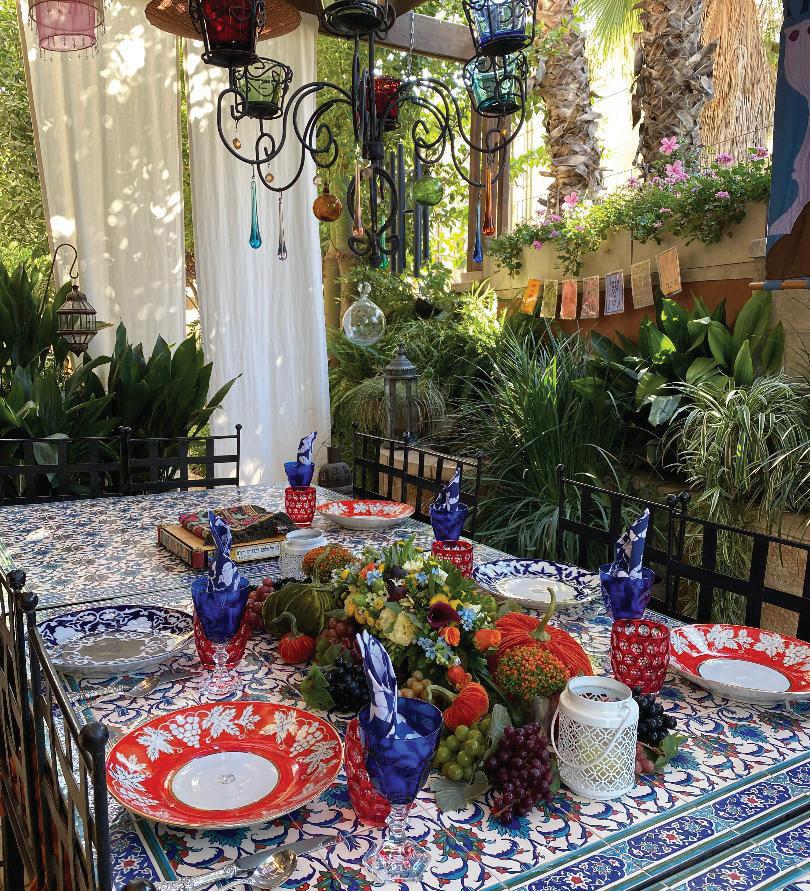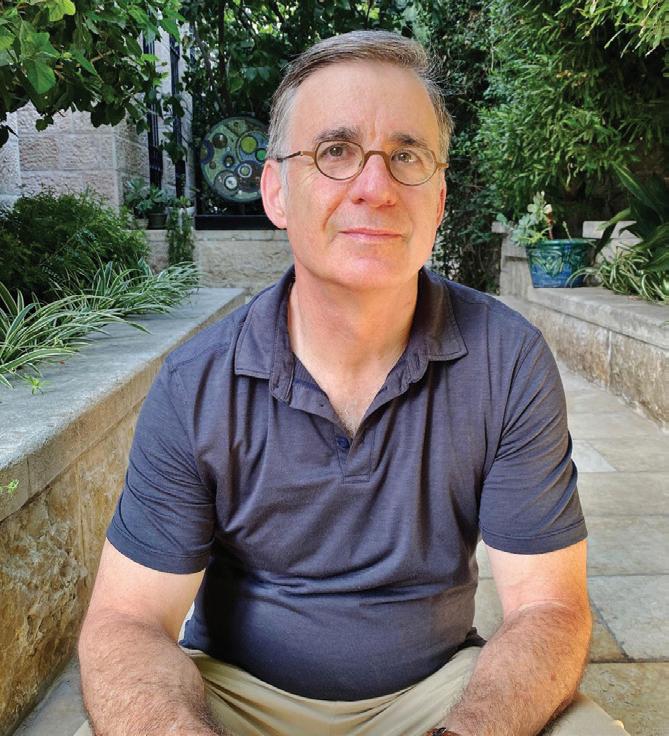
10 minute read
ISRAEL
The Jewish Agency to Distribute Care Packages to Vulnerable Israelis for Rosh Hashanah
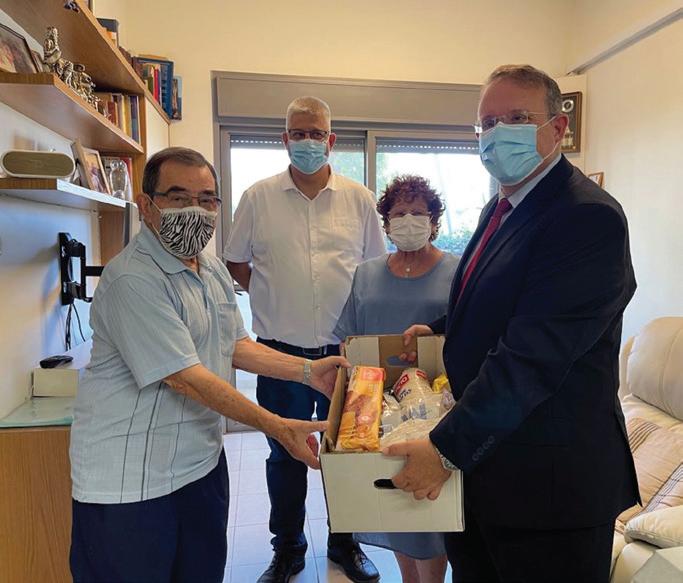
Yaakov Hagoel (far right) and Deputy Mayor of Kfar Saba Oren Cohen giving a care package to Holocaust survivors Juliette and Natan Goldman. (Photo credit: Amigour)
On the eve of the Jewish New Year, The Jewish Agency for Israel’s affordable housing subsidiary, Amigour, will provide comprehensive food care packages to the elderly and Holocaust survivors so they do not have to risk exposure when buying these essential supplies for Rosh Hashanah.
Amigour began the distribution campaign this week and will deliver 750,000 NIS ($233,000) worth of packages to its dozens of complexes nationwide, thanks to donations raised by The Jewish Agency for Israel, Keren Hayesod, the Jewish Federations of North
America (JFNA) and The Conference on Jewish Material Claims Against Germany.
Each food package, worth some 120 NIS ($37), includes wine, honey, honey cake, jam and other goods like pasta, rice, tuna, ptitim (Israeli couscous) and oil so that those in need can kick off the new year with a smile.
Since the onset of the pandemic, Amigour has distributed thousands of care packages to elderly residents in nursing homes to coincide with the Jewish holidays. Care packages were sent during Passover and Shavuot, for example, and those who needed to be in isolation received challahs for Shabbat.
NEWS FROM OUR JEWISH HOME
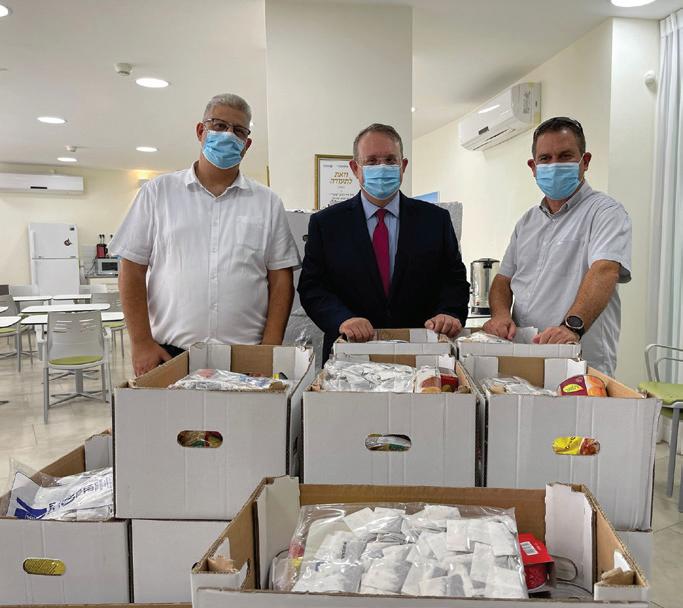
(L to R) Deputy Mayor of Kfar Saba Oren Cohen, Yaakov Hagoel, Senior Vice President of Amigour Erez Shani with the Rosh Hashanah care packages.
Brain Rehab Helps Wounded IDF Soldier
In 2018, 24-year-old Netanel Felber was shot in the head by a terrorist. Minimally conscious for several months, he is now making slow but steady recovery progress, against all odds, at Sheba Medical Center’s Brain Injury Rehabilitation Unit.
Felber was serving in an IDF combat unit in the Binyamin region, north of Jerusalem, when he was shot in the head by a Palestinian terrorist as he and two comrades guarded a bus stop at the Givat Assaf junction.
He and the other patients have an integrated multi-disciplinary team of dedicated professionals working with them, including rehab doctors, nurses, occupational therapists, physical therapists, psychologists and social workers. Another program promotes motor function with the help of a physiotherapy dog named Sheba. Felber started with just petting Sheba and getting sensory input from his fur. Now he can do so much more.
“Netanel is a rock star!” says Dr. Adi Gidali, a New York-trained physical therapy supervisor at the Outpatient Brain Injury Unit at Sheba Medical Center. “He is so determined and works hard every day. We’ve been excited to see how wonderfully he has progressed. We look forward to—and expect to see and be part of—the incredible strides he will continue to make. Netanel is an inspiration to everyone who comes in contact with him.”
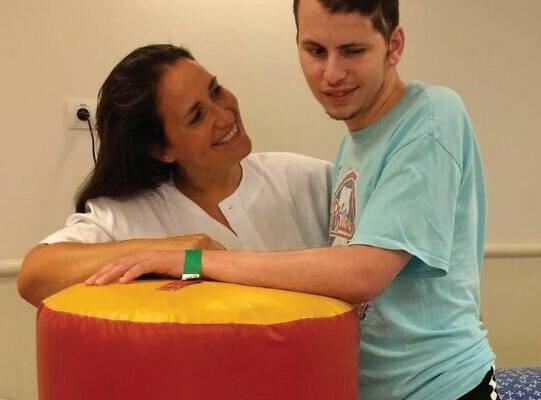
Dr. Adi Gidali, a New York-trained physical therapy supervisor at the Outpatient Brain Injury Unit at Sheba Medical Center, with 24-year-old recovering patient Netanel Felber. (Credit: Sheba Medical Center)
Today in Israeli History
September 15, 1891 — Journalist-novelist Moshe Yaacov Ben-Gavriel is born in Vienna, Austria. An Austrian soldier in Jerusalem in 1917, he fights for the British in World War II, then shifts from newspapers to novels and short stories.
September 16, 1949 — Israel becomes a member of the Paris-based U.N. Educational, Scientific and Cultural Organization. Israel withdraws from UNESCO in 2018 amid allegations back and forth about betraying history and culture.
September 17, 1948 — Count Folke Bernadotte, a Swedish mediator who negotiated a one-month ArabIsraeli cease-fire in June, is assassinated in Jerusalem by members of Lehi (the Stern Gang) over his plan for permanent peace.
September 18, 1918 — Champion swimmer Judith Deutsch is born in Vienna, Austria. She joins fellow Austrian swimmers Ruth Langer and Lucie Goldner in refusing to go to the 1936 Olympics in Berlin and soon makes aliyah.
September 19, 2014 — Filmmaker Avraham Heffner dies at 79 in Tel Aviv. He made his acting debut in 1964’s “Hole in the Moon.” He wrote and directed “But Where Is Daniel Wax?” — considered Israel’s greatest movie by some scholars.
September 20, 1931 — Actress Haya Harareet, best known as Judah Ben-Hur’s love interest Esther in the 1959 remake of “Ben-Hur,” is born in Haifa. She appears in Israeli, Italian, U.S. and British films from 1955 to 1964. September 21, 2010 — Diplomat and legal scholar Shabtai Rosenne, a Bar-Ilan University professor, dies of a heart attack at 92. He contributed to the law of treaties and law of the sea and formulated Israel’s 1949 armistice agreements.
September 22, 1943
— Singer-songwriter Ariel Zilber is born in Tel Aviv. In the 1970s and 1980s he establishes an eclectic sound and leads multiple rock bands, then has a successful solo career. His music spans rock, pop and hip-hop.
September 23, 1920 — Ovadia Yosef, a rabbi and community leader, is born in Baghdad. He moves to Jerusalem at age 4. He is Israel’s chief Sephardi rabbi from 1973 to 1983, then serves as the spiritual leader of political party Shas.
September 24, 1996 — A northern exit from the Western Wall Tunnel to the Via Dolorosa opens to the public, leading to three days of Palestinian riots. The project is seen as an expression of Israeli sovereignty over all of Jerusalem.
September 25, 1982 — Some 400,000 protesters in Tel Aviv answer the massacre Sept. 16 to 18 in the Sabra and Shatila refugee camps in Lebanon with a demand for an investigation into Israel’s role in the Palestinian
deaths. September 26, 1955 — Oil is discovered in Heletz, a moshav founded by Yemeni immigrants in southern Israel that becomes the site of the state’s first successful oil well. The field contains an estimated 94.4 million barrels of oil. September 27, 1955 — Egyptian President Gamal Abdel Nasser says Czechoslovakia will supply his nation heavy Soviet weaponry, including tanks, MiG-15 fighters and heavy bombers. The deal influences Israel’s decision to attack in 1956. September 28, 1970 — Egyptian President Gamal Abdel Nasser dies of a heart attack at 52 shortly after brokering a cease-fire between Jordan’s King Hussein and PLO leader Yasser Arafat. He recently expressed openness to peace with Israel. September 29, 1947 — The Arab Higher Committee for Palestine formally rejects the U.N. Special Committee on Palestine’s partition plan, which calls for separate Jewish and Arab states and an international zone around Judith Deutsch (left) and teammates Hedy Bienenfeld, Jerusalem.
Fritzi Loewy and Lucie
Goldner pose with Zsigo Wertheimer, their coach at the Jewish swim club Hakoah
Vienna, in the mid-1930s.
Most Austrian clubs didn’t admit Jewish swimmers.
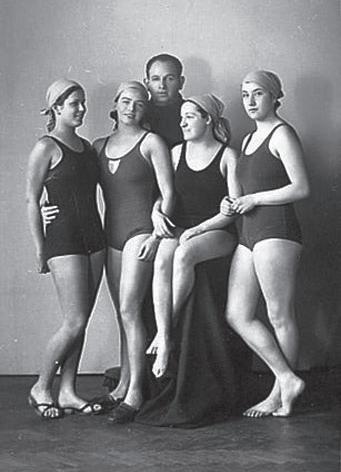
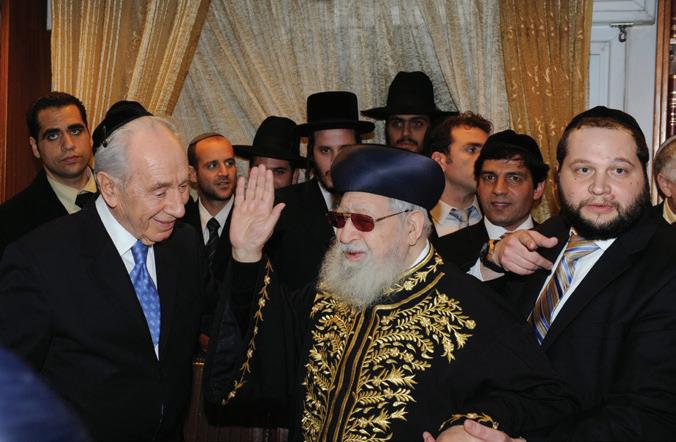
By Moshe Miller, Israeli Government Press Office // President Shimon Peres joins Rabbi Ovadia Yosef at a celebration at Yosef’s home in Jerusalem in February 2011.
Items are provided by the Center for Israel Education (israeled.org), where you can find more details.
5782 Starts the Sabbatical Year
By Jan Jaben-Eilon
The Jewish year 5782, which began on Sept. 7, is not an ordinary year in the Jewish calendar. It is known as a sabbatical year, or Shmita, as mentioned in the Book of Exodus. While most of the Atlanta Jewish community will probably not take much note, for Jews in Israel – particularly Orthodox Jews – the Shmita, has everyday significance.
In Hebrew, shnat shmita literally means “a year let go” or “released” — a year in which the Land of Israel is left to rest. According to the Torah, the land may not be worked, nor its produce bought and sold. While the “land” in question applies only to agriculture in Israel, there are also implications for Jews in the Diaspora.
According to Chabad, produce imported from Israel must have rabbinical certification and is subject to some laws and restrictions due to its sanctity. Also, the aspect of Shmita that applies to debt absolution affects Jews around the world. The Torah states that all private debts are forgiven, while public debts are exempt during the sabbatical year.
Again, in Israel, this facet of Shmita is more apparent. According to former Atlantan David Arnovitz, “For the absolution of debts, there is a legal practice called prozbul that allows debts to be carried over the Shmita year that every bank and business uses. In Israel, you can see the certificate in the bank.”
An Atlanta native who attended the Hebrew Academy – now the Atlanta Jewish Academy – and Briarcliff High School, Arnovitz made aliyah with his wife Andi and their five children in July 1999. He is currently the editor in chief of the “Koren Tanakh of the Land of Israel,” a series put out by Koren Publishers that tries to put the Bible in its ancient Near Eastern context.
Aside from seeing certificates in local banks, Arnovitz explains that his family observes Shmita in their own garden, doing only maintenance and improvement during the year. “We buy produce at the grocery store that holds according to one of the Shmita policies: either imported, heter mechira [selling land or transferring ownership to avoid the prohibition] (most stores, restaurants and food manufacturers do this, but it is not deemed strict enough by more observant people), or otzar beit din (more strict people do this).”
The nuances, Arnovitz said, are hard to explain, but essentially “you can eat whatever grows from your garden, but you can’t plant new things.”
Another former Atlantan, Rabbi Adam Frank, told the AJT that “unless a person directly engages in the growing or selling of produce, practically speaking, the Shmita year will not be an imposition or mean any change of behavior for Israelis. The Israeli rabbanut [religious authorities] utilizes dispensation methods to allow for the necessary provision of produce for the country’s population. The one area that may complicate matters for the Israeli on the street is in the area of planting one’s private garden. Many observant Jews will make arrangements to avoid any new planting in the property under their jurisdiction.”
Frank, who is currently involved in social activism aimed at breaking the Israeli rabbanut’s monopoly on religious authority, said the level of observance of Shmita varies among Jews worldwide.
“All observant Jews, whether Orthodox or otherwise, are aware of the matter [of Shmita] and are happy to rely on the state rabbinic authorities to make proper arrangements for the provision of produce,” said Frank. “Like the greater Jewish population, people’s private practices vary and there are both Orthodox and non-Orthodox Jews who are less stringent on matters of avoiding planting on personal property. Without a doubt, the level of fervency that one expresses for Jewish ritual during the rest of the year is also expressed in the observance of Shmita.”
Arnovitz’s rabbi, Shai Finkelstein of Kehilat Nitzanim in Jerusalem, recently sent out practical instructions for observing Shmita to his congregants. According to Rabbi Finkelstein, flowers can be planted until the 26th of Elul, which coincides with Sept. 3. He also addressed the question of whether people can plant household plants, noting that there are disputes depending on whether a “closed” or “unperforated” pot is used. Perhaps more importantly, Finkelstein said mowing one’s lawn is allowed, but weeding is prohibited during Shmita.
Again, those rules apply to property in Israel. Diaspora Jews may be impacted, however, by the fact that the Jewish National Fund will also stop planting trees for the next year. ì
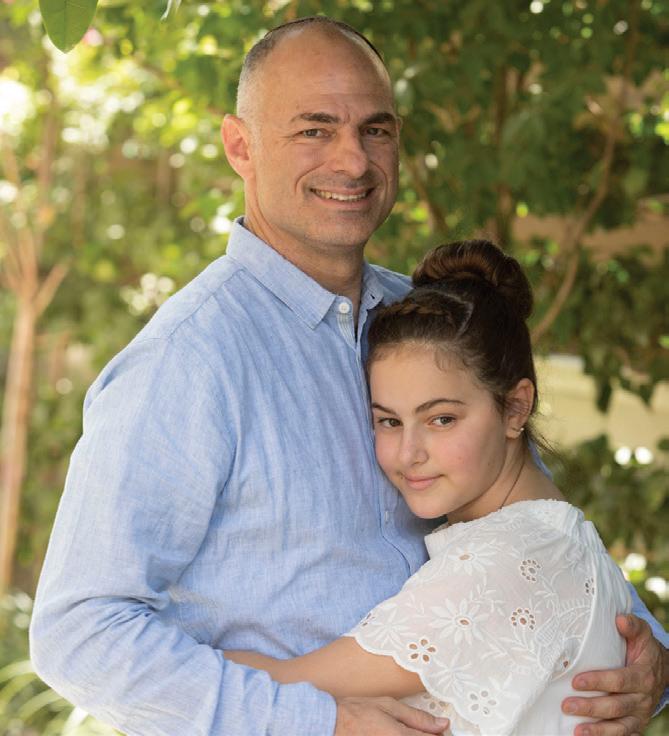
Rabbi Adam Frank (with daughter Tamar last year for her bat mitzvah) said observance of Shmita varies among Jews.
A Sukkah at the home of the Arnovitzes, who emigrated from Atlanta in 1999. “You can eat whatever grows from your garden, but you can’t plant new things,” said David Arnovitz. David and Andi Arnovitz’s Jerusalem garden.
